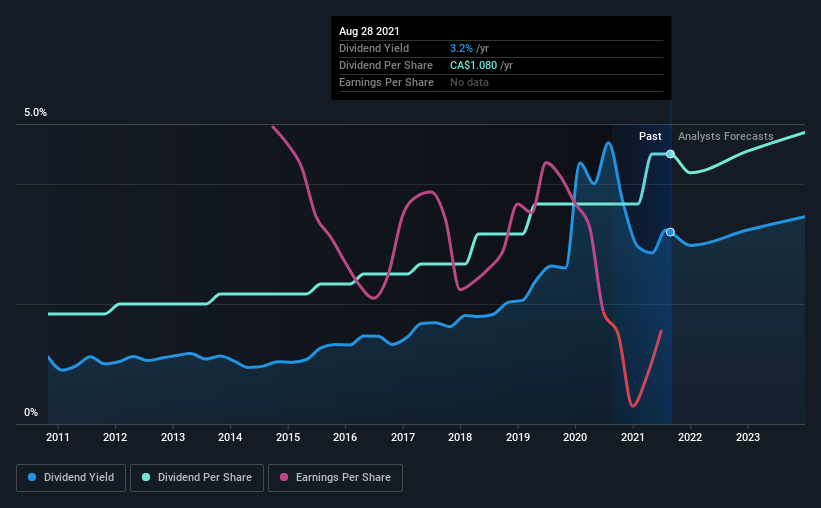Do These 3 Checks Before Buying Imperial Oil Limited (TSE:IMO) For Its Upcoming Dividend
Readers hoping to buy Imperial Oil Limited (TSE:IMO) for its dividend will need to make their move shortly, as the stock is about to trade ex-dividend. The ex-dividend date is one business day before a company's record date, which is the date on which the company determines which shareholders are entitled to receive a dividend. The ex-dividend date is important as the process of settlement involves two full business days. So if you miss that date, you would not show up on the company's books on the record date. This means that investors who purchase Imperial Oil's shares on or after the 2nd of September will not receive the dividend, which will be paid on the 1st of October.
The company's upcoming dividend is CA$0.27 a share, following on from the last 12 months, when the company distributed a total of CA$1.08 per share to shareholders. Looking at the last 12 months of distributions, Imperial Oil has a trailing yield of approximately 3.2% on its current stock price of CA$33.76. Dividends are a major contributor to investment returns for long term holders, but only if the dividend continues to be paid. That's why we should always check whether the dividend payments appear sustainable, and if the company is growing.
View our latest analysis for Imperial Oil
Dividends are usually paid out of company profits, so if a company pays out more than it earned then its dividend is usually at greater risk of being cut. Imperial Oil reported a loss after tax last year, which means it's paying a dividend despite being unprofitable. While this might be a one-off event, this is unlikely to be sustainable in the long term. Considering the lack of profitability, we also need to check if the company generated enough cash flow to cover the dividend payment. If Imperial Oil didn't generate enough cash to pay the dividend, then it must have either paid from cash in the bank or by borrowing money, neither of which is sustainable in the long term. Fortunately, it paid out only 28% of its free cash flow in the past year.
Click here to see the company's payout ratio, plus analyst estimates of its future dividends.
Have Earnings And Dividends Been Growing?
When earnings decline, dividend companies become much harder to analyse and own safely. If earnings decline and the company is forced to cut its dividend, investors could watch the value of their investment go up in smoke. Imperial Oil reported a loss last year, and the general trend suggests its earnings have also been declining in recent years, making us wonder if the dividend is at risk.
The main way most investors will assess a company's dividend prospects is by checking the historical rate of dividend growth. In the last 10 years, Imperial Oil has lifted its dividend by approximately 9.4% a year on average.
Remember, you can always get a snapshot of Imperial Oil's financial health, by checking our visualisation of its financial health, here.
The Bottom Line
Has Imperial Oil got what it takes to maintain its dividend payments? It's hard to get used to Imperial Oil paying a dividend despite reporting a loss over the past year. At least the dividend was covered by free cash flow, however. It's not that we think Imperial Oil is a bad company, but these characteristics don't generally lead to outstanding dividend performance.
So if you're still interested in Imperial Oil despite it's poor dividend qualities, you should be well informed on some of the risks facing this stock. Case in point: We've spotted 1 warning sign for Imperial Oil you should be aware of.
We wouldn't recommend just buying the first dividend stock you see, though. Here's a list of interesting dividend stocks with a greater than 2% yield and an upcoming dividend.
This article by Simply Wall St is general in nature. We provide commentary based on historical data and analyst forecasts only using an unbiased methodology and our articles are not intended to be financial advice. It does not constitute a recommendation to buy or sell any stock, and does not take account of your objectives, or your financial situation. We aim to bring you long-term focused analysis driven by fundamental data. Note that our analysis may not factor in the latest price-sensitive company announcements or qualitative material. Simply Wall St has no position in any stocks mentioned.
Have feedback on this article? Concerned about the content? Get in touch with us directly. Alternatively, email editorial-team (at) simplywallst.com.


